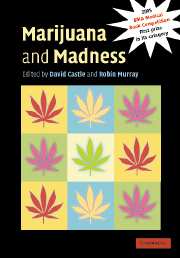Book contents
- Frontmatter
- Contents
- List of contributors
- Foreword
- Preface
- 1 The cannabinoid system: from the point of view of a chemist
- 2 How cannabis works in the brain
- 3 Acute and subacute psychomimetic effects of cannabis in humans
- 4 The association between cannabis use and depression: a review of the evidence
- 5 Cannabis and psychosis proneness
- 6 Is there a specific ‘cannabis psychosis’?
- 7 Cannabis as a potential causal factor in schizophrenia
- 8 Cannabis abuse and the course of schizophrenia
- 9 The endogenous cannabinoid system in schizophrenia
- 10 Cannabinoid ‘model’ psychosis, dopamine–cannabinoid interactions and implications for schizophrenia
- 11 Motives that maintain cannabis use among individuals with psychotic disorders
- 12 Addressing cannabis abuse in people with psychosis
- 13 Residual cognitive effects of long-term cannabis use
- Index
- References
8 - Cannabis abuse and the course of schizophrenia
Published online by Cambridge University Press: 07 December 2009
- Frontmatter
- Contents
- List of contributors
- Foreword
- Preface
- 1 The cannabinoid system: from the point of view of a chemist
- 2 How cannabis works in the brain
- 3 Acute and subacute psychomimetic effects of cannabis in humans
- 4 The association between cannabis use and depression: a review of the evidence
- 5 Cannabis and psychosis proneness
- 6 Is there a specific ‘cannabis psychosis’?
- 7 Cannabis as a potential causal factor in schizophrenia
- 8 Cannabis abuse and the course of schizophrenia
- 9 The endogenous cannabinoid system in schizophrenia
- 10 Cannabinoid ‘model’ psychosis, dopamine–cannabinoid interactions and implications for schizophrenia
- 11 Motives that maintain cannabis use among individuals with psychotic disorders
- 12 Addressing cannabis abuse in people with psychosis
- 13 Residual cognitive effects of long-term cannabis use
- Index
- References
Summary
As detailed elsewhere in this book (Chapter 3), cannabis has been used for centuries to produce euphoria and relaxation as desired mental effects. However, adverse effects of intoxication with cannabis include anxiety and panic (Thomas, 1996; Reilly et al., 1998), depression (Bovasso, 2001; Patton et al., 2002: see Chapter 4), and impairment in certain domains of cognitive function (see Chapters 3 and 13). Psychosis, including paranoid delusions and hallucinations, has been found to be an effect of cannabis use in cohort studies from New Zealand (Thomas, 1996), Vietnam (Talbott and Teague, 1969), India (Chopra and Smith, 1974) and Pakistan (Chaudry et al., 1991) (Chapter 6). This work suggests that cannabis, especially in high doses, can produce a toxic psychosis in people without mental disorders. Evidence for cannabis (and especially heavy abuse) as a causal risk factor for psychotic disorders comes from epidemiological studies of Swedish conscripts (Andreasson et al., 1987; Zammit et al., 2002), from the Dunedin study from New Zealand (Arsenault et al., 2002), from a Dutch sample (Van Os et al., 2002) and from a study of Israeli conscripts (Weiser et al., 2001) (see Chapter 7).
Schizophrenia and related psychotic disorders are clinical syndromes with a wide variation in symptoms between individuals (Thaker and Carpenter, 2001). Factor-analytic studies of schizophrenia have revealed that the symptoms are best described by three dimensions or syndromes: reality distortion (hallucinations and delusions), psychomotor poverty (restriction of affect, loss of motivation and restricted emotional experience) and disorganization (disorganized thought, incongruity of affect and bizarre behaviour) (Liddle, 1987).
- Type
- Chapter
- Information
- Marijuana and MadnessPsychiatry and Neurobiology, pp. 119 - 126Publisher: Cambridge University PressPrint publication year: 2004
References
- 4
- Cited by

